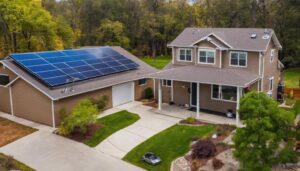Considering a solar upgrade is like navigating a complex maze; one wrong turn could lead to costly errors. Before diving into the process, ensure you’re equipped with the necessary knowledge and precautions to avoid common pitfalls.
By understanding the intricacies of solar system upgrades, you can safeguard your investment and reap long-term benefits.
Key Takeaways
- Get multiple quotes and detailed analysis for upgrades.
- Understand feed-in tariff rules and impacts on existing agreements.
- Consider system size limits and potential additional costs.
- Assess benefits like cost savings, property value increase, and energy independence.
Solar System Evaluation Checklist
When evaluating your solar system, begin by meticulously inspecting its components and performance to ensure optimal efficiency and longevity. Start by checking the performance metrics of your system, such as energy output and consistency.
Conduct a thorough component inspection by visually examining your solar panels, roof junction box, and inverter for any signs of wear or damage. Look for issues like corrosion, discolouration, or loose connections that could impact the system’s effectiveness.
Ensure all components are in good condition and functioning correctly to maximize energy generation. Monitoring these aspects regularly will help you identify any potential problems early on and maintain your solar system’s efficiency over time.
Upgrade Quotes and FiT Considerations
Inspecting your current solar system thoroughly is crucial before obtaining upgrade quotes and considering Feed-in Tariff (FiT) implications. To ensure a successful upgrade and maximize benefits, consider the following:
- Financial Implications: Understand the cost of the upgrade and how it fits into your budget planning.
- Energy Efficiency: Evaluate how the upgrade can improve system optimization and energy generation.
- FiT Rules: Clarify how the upgrade may impact your current FiT agreement and any changes in compensation rates.
- Meter Requirements: Inquire about the need for a second meter and associated costs for the upgrade.
- Regulation Awareness: Stay informed about changes in regulations that may affect your FiT agreement.
System Size and Regulations Awareness
To ensure a successful solar upgrade and compliance with regulations, understanding system size limitations and relevant rules is essential. When considering system sizing, it’s crucial to be aware that there are limits in place, with some states having nominal maximum system sizes.
Additionally, electricity network operators may impose network analysis fees, and changes in energy consumption could lead to adjustments by your retailer. Understanding these aspects is key to avoiding complications and ensuring your upgrade meets regulatory compliance.
Benefits of Solar Panel Upgrades
For a homeowner seeking to maximize the benefits of their solar investment, understanding the potential advantages of solar panel upgrades is key to optimizing energy efficiency and cost savings.
Upgrading your solar panels can bring about several benefits, such as:
- Cost savings: By upgrading to more efficient panels, you can lower your electricity bills significantly over time.
- Environmental impact: Upgrading to newer solar technology can further reduce your carbon footprint, contributing to a greener planet.
- Increased energy production: Newer panels can generate more electricity from the same amount of sunlight.
- Improved property value: Upgraded solar panels can enhance the overall value of your home.
- Enhanced system reliability: Upgrades can ensure that your solar system operates smoothly for years to come.
Installation Process Overview
When beginning the solar installation process, ensure an initial consultation and assessment are conducted to kickstart the project efficiently. This step is crucial for determining the optimal system layout considering energy efficiency and potential installation challenges.
Designing the layout accurately is essential to maximize the solar system’s performance and ensure it meets your energy needs. Obtaining necessary permits promptly will help avoid delays in the installation process.
Once the design is finalized, professional technicians will handle the installation, ensuring everything is set up correctly. A final inspection will be conducted before system activation to guarantee it operates smoothly.
Essential Maintenance Practices
Regularly cleaning your solar panels is crucial for maintaining optimal performance and maximizing energy production. Neglecting this essential maintenance practice can lead to a decrease in panel efficiency over time. To ensure your solar system operates at its best, here are some key maintenance tips:
- Clear off any debris like leaves, dust, or bird droppings that may accumulate on the panels.
- Use a soft brush or cloth with mild detergent and water to gently clean the surface of the panels.
- Check for any shading obstructions that may affect the sunlight reaching your panels.
- Schedule professional inspections annually to detect any issues early on.
- Keep a record of your energy production and savings to track the effectiveness of your maintenance efforts.
Potential Traps to Avoid
To steer clear of common pitfalls during a solar upgrade, it’s essential to thoroughly research and compare quotes from reputable solar companies.
One of the costly mistakes to avoid is rushing into a decision without understanding all the details. Take the time to review the terms of the upgrade, including any potential changes to feed-in tariffs or additional costs like a second-meter installation.
Common pitfalls also include not clarifying how your existing FiT will be affected post-upgrade and overlooking the impact on warranties when expanding current equipment.
Impact on Property Value
As you continue your journey through solar upgrades, understanding how these enhancements can impact the value of your property becomes a crucial aspect to consider. When it comes to property appraisal and market trends, here are some key points to keep in mind:
- Solar installations can increase property value by up to 4%.
- The value added depends on factors like system size, efficiency, and age.
- Local market trends play a significant role in determining the impact.
- Ensure proper documentation of the solar system’s installation and performance.
- Consider consulting with real estate professionals to gauge the specific impact on your property.
Frequently Asked Questions
How Can I Determine if My Home Is Suitable for a Solar Panel Upgrade?
To determine if your home is suitable for a solar panel upgrade, start with a roof assessment for sun exposure. Consider energy efficiency and cost savings. Seek professional advice for optimal placement and financial benefits.
What Are the Common Mistakes to Avoid When Selecting New Solar Equipment for an Upgrade?
When selecting new solar equipment for an upgrade, avoid common pitfalls like improper system sizing, mismatched components, and overlooking shading issues. Installation errors can arise from poor placement, inadequate wiring, or neglecting maintenance requirements.
Are There Any Specific Maintenance Tasks That Are Often Overlooked by Solar Panel Owners?
When owning solar panels, make sure to prioritize panel cleaning and maintenance schedules. Don’t overlook inverter inspections and wiring checks. These tasks are crucial for optimal system performance and longevity. Stay proactive in caring for your solar investment.
How Can I Assess the Impact of a Solar Panel Upgrade on My Property’s Overall Value?
Assessing the impact of a solar panel upgrade on your property’s value involves a thorough property assessment and ROI analysis. Consider solar panel compatibility and follow installation guidelines for optimal results. It’s crucial for maximizing benefits.
What Financial Considerations Should I Keep in Mind When Planning a Solar Upgrade for My Home?
When planning a solar upgrade for your home, ensure you consider financial planning, energy savings, return on investment, and tax incentives. These key factors will help you make a well-informed decision for cost-effective upgrades.
Conclusion
In conclusion, upgrading your solar system can be a great investment, but it’s important to be well-informed and avoid common mistakes. By carefully evaluating quotes, understanding feed-in tariffs, and staying aware of regulations, you can maximize the benefits of your solar upgrade.
Remember to consider factors like system size, shading, and maintenance to ensure a smooth and successful transition to a more sustainable energy solution. Stay informed, stay proactive, and enjoy the benefits of a solar-powered future.



